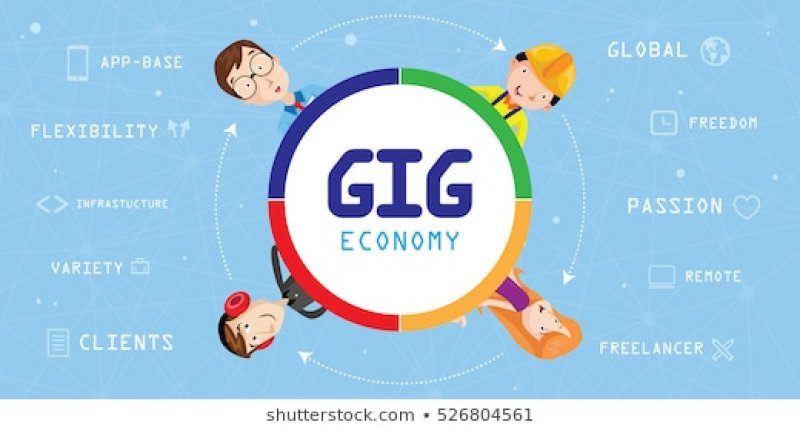With the growing number of skilled workers turning to agile work, it explores how the talent economy differs from the gig economy, its offerings from a very different combination of benefits and challenges, and why it can lead to the end of traditional employment.
One of the main trends in society in the last five years, and mainly in the business world, is the gig economy. Companies such as Uber, Fiverr, Instacart, 99Designs, and TaskRabbit, allow businesses around the world to provide on-demand services in a wide range of areas, from moving people by car to designing the cover of someone's new book.
There is no discussion about the impact these platforms have had on the way we live and work. It took Uber just five years to disrupt the 17th century taxi industry, deploy over a million drivers in 300 cities, and register the billionth ride. Numerous studies and articles highlight the growth of freelancing or gig work, from McKinsey, which estimates that some 162 million people in the US and EU are self-employed, to Forbes, which suggests that 50% of the US workforce will be freelancing by 2020.
The companies that drive the gig economy celebrate its benefits - flexibility, additional income, freedom, access to opportunity, and ease of use for customers. In addition, the challenges presented by the gig economy have been widely highlighted, including lack of stability, downward wage pressure, limited opportunities, and emptying out employment prospects for workers.
While there are certainly reasons to discuss the supply-driven downward trend in the gig economy, the question is whether all of these elements are true for all self-employment. Is the lack of job stability the result of the gig economy and the platforms that drive this change in the world of work? Or, if on the contrary, these platforms respond to the general change in the nature of employment, where employers can no longer guarantee employment for life, and the worker can no longer expect it.
Lost in the midst of this discussion is a deeper understanding of the causes of this change, as well as the differentiation of types of self-employment. The situation of a Hollywood actor is not the same as that of a Uber driver, and the situation of a student working 15 hours a week making Instacart mailings is not the same as that of an independent consultant helping a Fortune 500 company take advantage of new technology.
We believe that there are really two gigantic economies - the gig economy, where work becomes a commodity, and the platform is the differentiator; and the talent economy, where talent is the differentiator and the platform is a facilitator.
In the gig economy customers are given on-demand access to a wide variety of undifferentiated services - ease of access and low costs are the differentiating element, not necessarily the individual providing the service.
In the talent economy, the client buys the skill and expertise of the talent - the platform is just a facilitator, reducing the inefficiencies of the traditional employment and staffing markets, enabling the discovery of talent that otherwise remains invisible to the client.
A matter that is discussed more frequently than the gig economy is the talent gap. Many studies, including reports by PwC and Capgemini, have identified the ability to find the right talent as a key business risk. Recently, we interviewed more than 1,000 business leaders and managers from around the world, and asked them to put together a list of the top reasons for bringing in outside talent to work with their internal teams. The top three reasons were flexibility, access to expertise, and speed - cost came far below, in fourth place.
A Deloitte survey conducted in 2014 found that 51% of surveyed executives expect the use of contingent (agile) talent to increase in the next 3 to 5 years. Our own survey, conducted in 2017, showed that the percentage jumped to 76%. There is no doubt that executives' confidence in the durability of the talent economy continues to grow across all geographies and sectors.
This makes sense. The pace of change in business and technology is relentless, and the range of talent required by an organization - specific skills, abilities and experience - changes not weekly, but daily, while competition for in-demand skills becomes increasingly intense.
With a more efficient talent market, companies can build teams with the exact talent they need, exactly when it is needed. On the other hand, talent is more likely to find the best opportunities for themselves and their career, based on what seems most important to them at the time (flexibility, opportunity, income, ability to work remotely, etc.).
The pace of change in business is demanding teams that are formed faster, as well as being able to adjust more frequently, putting greater pressure on traditional recruitment and talent acquisition mechanisms. The gig economy, by turning certain services into commodities, makes it easier, faster and less expensive to obtain services. However, it does not achieve the same effectiveness when it comes to generating a platform for highly qualified and differentiated talent and services. The same gig concepts are applied for the highly qualified talent, but the impact on the workers is very different and for diverse reasons.
In the talent economy, people with skills and abilities in demand can have opportunities around the world, and organizations can build the teams they need to compete in a dynamic global economy fast and easily. In our recent survey, we also asked the same group of business leaders to identify the most important factors for engaging external talent - the quality of the talent was by far the most important element, almost twice as important as the cost.
This suggests that, in the talent economy, companies are looking for not the cheapest but the best people. As a result, instead of being limited to a small number of opportunities that are right under their noses, talented individuals will be able to make themselves available to a much wider range of opportunities, both locally and globally. With more options, they will be able to optimize the elements that are most relevant to them - flexibility, compensation, skill building, or the opportunity to work on a particularly interesting project.
What about stability? As the talent economy takes hold, and the talent market becomes deeper and more efficient, more stability could be generated for talent, especially for talent with more valued skills. Instead of relying on a single company, talent will be able to access a much wider range of work, creating stability.
Certainly, laws and regulations will have to change in order to support talented workers in this new model, and we will have to rethink many of the traditional support structures. However, the ability to build teams of highly skilled workers when needed, and the ability of talented workers to choose from a wide range of opportunities, is an emerging trend that, if done correctly, can generate significant benefits to the parties involved.
Basic economic theory tells us that when something in the market is not differentiated, it becomes a commodity, and the main decision factor is cost. Inevitably, this puts downward pressure on the price of the commodity in that market. Certainly, we can debate whether an Uber driver, or an Instacart shipper, provides a commodity service to those platforms, but, either way, the market treats those services as commodities, since it drives the price of labour down.
Nevertheless, is this also the case with software engineers, data scientists, machine learning specialists, finance professionals, or filmmakers? Is there a difference between two software engineers, and the value they bring to the organization? Our research and experience shows that there are differences, and when the point of value in a market is highly differentiated and demanded, the price goes up, especially for the best.
As a result, the talent economy may be the end of traditional employment, but this will not be a bad thing for the talent that drives it, or for the organizations that benefit from hiring the best talent. Although they have similarities in several respects, there are clear differences between the gig economy and the talent economy - and their impact on individuals, businesses and society. As we said earlier, the talent economy offers organizations access to highly skilled talent (a crucial issue for employers), differentiated work, high growth potential, and control over workers. All the benefits for employees that seem not to exist in the commoditized work that currently drives the gig economy.
With this offer, it will not be a surprise that the most qualified professionals are turning to agile work. Moreover, this will have a profound impact on how organizations discover talent and build teams, and how qualified individuals find opportunities.
*Michael Kearns is VP of Enterprise Strategy, Toptal














